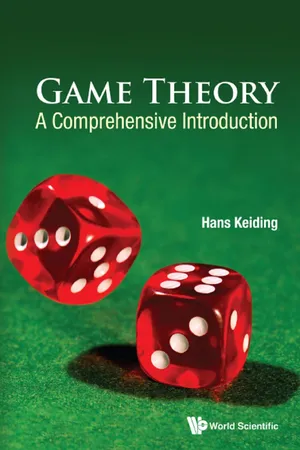
- 320 pages
- English
- ePUB (mobile friendly)
- Available on iOS & Android
About this book
This book is intended as an introduction to game theory which goes beyond the field of application, economics, and which introduces the reader to as many different sides of game theory as possible within the limitations of an introduction. The main goal is to give an impression of the diversity of game theoretical models, while at the same time covering the standard topics. The book has an equal coverage of non-cooperative and cooperative games, and it covers several topics such as selecting Nash equilibria, non-transferable utility games, applications of game theory to logic, combinatorial and differential games.
Request Inspection Copy
This book is intended as an introduction to game theory which goes beyond the field of application, economics, and which introduces the reader to as many different sides of game theory as possible within the limitations of an introduction. The main goal is to give an impression of the diversity of game theoretical models, while at the same time covering the standard topics. The book has an equal coverage of non-cooperative and cooperative games, and it covers several topics such as selecting Nash equilibria, non-transferable utility games, applications of game theory to logic, combinatorial and differential games.
Request Inspection Copy
Contents:
- Non-Cooperative Game Theory:
- Two Person Zero-Sum Games
- Applications of Minimax Theory
- Solutions for General Non-Cooperative Games
- More About Nash Equilibria
- Games with Incomplete Information
- Choosing Among Nash Equilibria
- Repeated Games
- Selected Topics in Non-Cooperative Games
- Cooperative Game Theory:
- Introduction to Cooperative Games
- Bargaining
- TU Games: Classical Solutions
- TU Games: Other Solutions
- Solutions of NTU Games: The Core
- Values of NTU Games
- The Theory of Game Forms
Key Features:
- Introduces the reader to as many different sides of game theory as possible, within the limitations of an introduction
- More detailed treatment of cooperative game theory
- More emphasis on parts of game theory which rarely show up in introductions, such as combinatorial games, applications to logic, differential games
Tools to learn more effectively

Saving Books

Keyword Search

Annotating Text

Listen to it instead
Information
Chapter 1
Introduction
1 What is game theory?
2 Definition of a game



Table of contents
- Cover page
- Title page
- Copyright page
- Preface
- Contents
- 1. Introduction
- Non-Cooperative Game Theory
- Cooperative Game Theory
- Bibliography
- Index
Frequently asked questions
- Essential is ideal for learners and professionals who enjoy exploring a wide range of subjects. Access the Essential Library with 800,000+ trusted titles and best-sellers across business, personal growth, and the humanities. Includes unlimited reading time and Standard Read Aloud voice.
- Complete: Perfect for advanced learners and researchers needing full, unrestricted access. Unlock 1.4M+ books across hundreds of subjects, including academic and specialized titles. The Complete Plan also includes advanced features like Premium Read Aloud and Research Assistant.
Please note we cannot support devices running on iOS 13 and Android 7 or earlier. Learn more about using the app